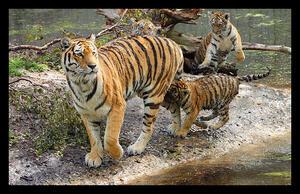The "Tiger mother" vs. the Jewish mother: The dangers of stereotypes
Courtesy of mcamcamca.
Amy Chua’s article in The Wall Street Journal last week, “Why Chinese Mothers Are Superior,” has stirred up a firestorm of comment, with literally thousands of mothers and their friends weighing in on Chua’s harsh treatment of her daughters—an approach Chua defines as “Chinese” as opposed to a more permissive “Western” strategy. Inevitably, a comparison to the famed Jewish mother arises, and for good reason.
At the outset, the similarities between Chua’s audacious, coldly demanding, punitive “Tiger Mother” and the familiar archetype of the overprotective Jewish mother seem apparent. Both hold tremendously high expectations for their children, especially in regard to education, and their single-minded focus on success and high standards typically produce achieving children (and as some commentators have pointed out in response to Chua’s example, also depressed, unhappy, or rebellious ones, though apparently not her own daughters.)
But there are significant differences between Chua’s portrayal of the Tiger Mother type and the Jewish Mother stereotype. The Tiger Mother is a tough, even cruel, disciplinarian; she won’t praise her kids in public; virtually chains them to hours of daily music practice; insists on their bringing home straight As and gold medals, forbids sleepovers and generally all distractions. In contrast, while the Jewish mother in popular culture has often been called a “monster mother,” even a “vulture,” she gets her children to perform not by punishment but by guilt. Control guilt, says Dan Greenburg in his myth-creating How To Be A Jewish Mother (1964), and you control the child. Guilt equals nagging equals smothering, but that is quite a different tactic than punishment.
What ‘s missing in Chua’s article is the humor, the vulnerability combined with tenacity with which Jewish mothers approach maternal care. Chua talks about making her daughter Lulu practice piano, rolling up her sleeves, and basically yelling at her and insulting her until she gets it right. Comments my own daughter, Lauren, a seasoned observer: “A Jewish mother within 20 minutes of the crying would totally cave in and say – ‘Are you hungry? What do you need? A sandwich? A nap? Some cake? Why don't I practice piano for you so that you can be happy and go play with your friends?’”
After studying nearly a century of Jewish mothers’ behavior and jokes and stories about them, I believe that by and large they got what they wanted—achieving children who are loyal and family-oriented—by enabling and nurturing them, not by disciplining them. Chua has protested that the responses to her article miss the fact that the book from which it is drawn is a memoir of her own parenting journey, apparently not always as superbly confident as it appears in the WSJ, and that the humor and vulnerability are there.
Chua’s Jewish husband, Jed Rubenfeld, reports in an interview that in return for raising their daughters as Jews, he agreed to let Chua rear them Chinese-style. But it’s questionable whether the father’s parenting values were totally absent. Child-rearing ideals, as well as strategies, do get passed on from generation to generation, and they are not so easily displaced from the household. Note that the Harvard-educated Chua, a Yale law professor like her husband, both of them deeply immersed in a competitive, highly disciplined, culture of achievement, identifies her mothering as “immigrant” based, rather than, say, professionally oriented and driven. It is likely that the “more permissive” style followed by Rubenfeld’s parents, with, he says, its “emphasis on individuality, creativity, and freedom” (thus typically “Western,” but also typically Jewish) influenced Rubenfeld and their offspring as well, modifying the “Tiger Mother” template, which, as even Chua admits, is exaggerated.
As with the Jewish mother ideal, which became a universally recognized but often noxious model of parenting, and not necessarily a depiction of realistic behaviors, Chua’s “Tiger Mother” stands the risk of defining a monolithic type of Chinese (or immigrant-ethnic-Asian) mothering, devoid of shading and variety. And then, like Dan Greenburg or Philip Roth in his notorious Portnoy’s Complaint, Chua will have created her own enduring “monster” mother.
Joyce Antler is the author of You Never Call! You Never Write! A History of the Jewish Mother.







I love the post! Please share some of your favorite Jewish children's books with me so I can review them. I am trying to compose a definitive review site http://jewishchildrenbookrevie... for Ages 2 to 16.Thanks,Ari
The post has been edited to correct the mispelling. Thanks for pointing it out and we apologize for the mistake.
It would be helpful, and lend more authority to your comments, if you checked the spellings of names before posting. The lady in question's name is Chua, not Chau.